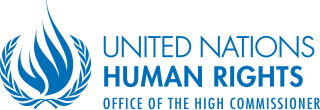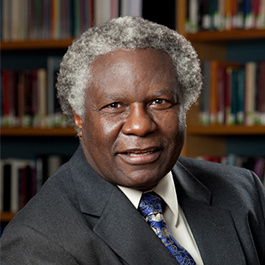
The Office of the United Nations High Commissioner for Human Rights (OHCHR) is a department of the United Nations Secretariat that works to promote and protect human rights that are guaranteed under international law and stipulated in the Universal Declaration of Human Rights of 1948. The office was established by the United Nations General Assembly on 20 December 1993 in the wake of the 1993 World Conference on Human Rights.

The United Nations Economic and Social Council (ECOSOC) is one of the six principal organs of the United Nations, responsible for coordinating the economic and social fields of the organization, specifically in regards to the fifteen specialized agencies, the eight functional commissions, and the five regional commissions under its jurisdiction.

The United Nations Industrial Development Organization (UNIDO) is a specialized agency of the United Nations that assists countries in economic and industrial development. It is headquartered at the UN Office in Vienna, Austria, with a permanent presence in over 60 countries. As of April 2019, UNIDO comprises 170 member states, which together set the organization's policies, programs, and principles through the biannual General Conference.

The UN Trade and Development (UNCTAD) is an intergovernmental organization within the United Nations Secretariat that promotes the interests of developing countries in world trade. It was established in 1964 by the United Nations General Assembly (UNGA) and reports to that body and the United Nations Economic and Social Council (ECOSOC). UNCTAD is composed of 195 member states and works with nongovernmental organizations worldwide; its permanent secretariat is in Geneva, Switzerland.

The United Nations Economic Commission for Europe is one of the five regional commissions under the jurisdiction of the United Nations Economic and Social Council. It was established in order to promote economic cooperation and integration among its member states.

The United Nations System consists of the United Nations' six principal bodies, the Specialized Agencies and related organizations. The UN System includes subsidiary bodies such as the separately administered funds and programmes, research and training institutes, and other subsidiary entities. Some of these organizations predate the founding of the United Nations in 1945 and were inherited after the dissolution of the League of Nations.
The consultative status is a phrase that has been in use since the establishment of the United Nations and is used within the UN community to refer to "Non-governmental organizations (NGOs) in Consultative Status with the United Nations Economic and Social Council". Also some international organizations could grant Consultative Status to NGOs. Organization for Security and Co-operation in Europe (OSCE) could grant Consultative Status in the form of "Researcher-in-residence programme" : accredited representatives of national and international NGOs are granted access to all records and to numerous topical compilations related to OSCE field activities.

The Commission on Narcotic Drugs (CND) is one of the functional commissions of the United Nations' Economic and Social Council (ECOSOC), and is the central drug policy-making body within the United Nations System. The CND also has important mandates under the three international drug control conventions, alongside the three other treaty-mandated bodies: United Nations Office on Drugs and Crime, World Health Organization, and International Narcotics Control Board.

The Commission on Population and Development (CPD) is one of the ten Functional Commissions of the United Nations Economic and Social Council. At its establishment by ECOSOC in October 1946, the Commission's name was "Population Commission" and in December 1994, was changed to "Commission on Population and Development".

Calestous Juma was a Kenyan scientist and academic, specializing in sustainable development. He was named one of the most influential 100 Africans in 2012, 2013 and 2014 by the New African magazine. He was Professor of the Practice of International Development and Faculty Chair of the Innovation for Economic Development Executive Program at Harvard Kennedy School. Juma was Director of the School's Science, Technology and Globalization Project at Harvard Kennedy School as well as the Agricultural Innovation in Africa Project funded by the Bill and Melinda Gates Foundation. His last book, Innovation and Its Enemies: Why People Resist New Technologies, was published by Oxford University Press in 2016.

The United Nations Permanent Forum on Indigenous Issues is the UN's central coordinating body for matters relating to the concerns and rights of the world's indigenous peoples. There are more than 370 million indigenous people in some 70 countries worldwide.
The Intergovernmental Working Group of Experts on International Standards of Accounting and Reporting (ISAR) is hosted by the United Nations Conference on Trade and Development (UNCTAD). Created in 1982 by the United Nations Economic and Social Council (ECOSOC), its mission is to facilitate investment, development and economic stability by promoting good practices in corporate transparency and accounting.

The Harvard International Relations Council(HIRC) is a non-profit organization that seeks to promote awareness of international relations based out of Harvard University. As several semi-independent but centrally funded programs, the IRC focuses on a number of different outreach areas in an attempt to engage and inform people on international issues and policy-making. Programs within the IRC include:
The Yearbook of the United Nations is an annual publication that provides comprehensive coverage of the United Nations' activity for each given year. The Yearbook, which is published by the United Nations Department of Global Communications, stands as "the authoritative reference work on the annual activities and concerns of the Organization." Fully indexed, the Yearbook also includes the texts of all major General Assembly, Security Council, and Economic and Social Council resolutions and decisions, placing them in a unique narrative context of United Nations consideration, deliberation and action. This in-depth narrative of its annual work has been produced by the United Nations since 1946.
The United Nations Guidelines for Consumer Protection (UNGCP) relate to consumer protection goals. The statement supplied is that the guidelines are "a valuable set of principles for setting out the main characteristics of effective consumer protection legislation, enforcement institutions and redress systems and for assisting interested Member States in formulating and enforcing domestic and regional laws, rules and regulations that are suitable to their own economic and social and environmental circumstances, as well as promoting international enforcement cooperation among Member States and encouraging the sharing of experiences in consumer protection."

A subdivision of both the United Nations General Assembly and the United Nations Economic and Social Council, the United Nations High-level Political Forum on Sustainable Development (HLPF) is responsible for the entire organization's policy on sustainable development.

The Committee for Development Policy is a subsidiary body of the United Nations Economic and Social Council (ECOSOC). The task of the CDP is to provide independent advice to the Council on development policy issues. The Committee is also responsible for deciding which countries can be considered least developed countries (LDCs).

Established in 1992, the Major Group for Children and Youth is the United Nations General Assembly mandated, official, formal and self-organised space for children and youth to contribute to and engage in certain intergovernmental and allied policy processes at the United Nations.

The United Nations Committee of Experts on Public Administration (CEPA) is an expert body that meets under the auspices of the United Nations Economic and Social Council in order to discuss and find ways to support the work of the Council by providing expert advice on matters concerning governance and public administration structures.









